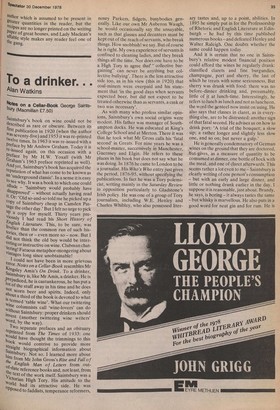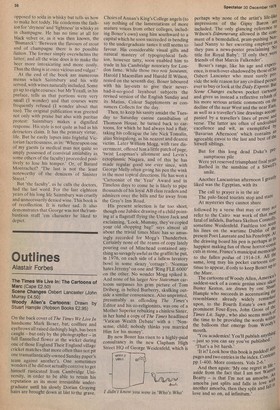To a drinker...
Alan Watkins
tes on a Cellar-Book George Saintsbury (Macmillan £7.50) Saintsbury's book on wine could not be described as rare or obscure. Between its firSt publication in 1920 (when the author was seventy-five) and 1953 it was re-printed twelve times. In 1963 it was re-issued with a Preface by Mr Andrew Graham. Today it is re-issued again, on this occasion with a Preface by Mr H.W. Yoxall (with Mr Graham's 1963 preface reprinted as well). And yet, Saintsbury's book has acquired the reputation of what has come to be known as 4111`underground classic'. In a sense it is easy to see why. It was a book to which one could ude — `Saintsbury would probably have disapproved — without actually having read Or: 'Old so-and-so told me he picked up a Copy of Saintsbury cheap in Camden Passage the other day.' But I felt no urge to pick up a copy for myself. Thirty years previously I had read his Short History of glish Literature. This, to be sure, was hvelier than the common run of such histo.ries, then or — even more so — now. But I did not think the old boy would be interesting or instructive on wine. Clubman chat ring! Fatuous metaphor-mongering about vintages long since unobtainable! I could not have been in more grievous ert:or. Notes on a Cellar-Book resembles Mr ICIUgsley Am is's On Drink. To a drinker, Saintsbury is, like Mr Amis, a drinker. He is .prejudiced, he is cantankerous, he has put a I°t of the stuff away in his time and he does not scorn beer and spirits. Indeed, only about a third of the book is devoted to what .terntea 'table wine'. What our twittering vine columnists call 'wine-lovers' can do Without Saintsbury: proper drinkers should Invest (another twittering wine writers' Word, by the way). Two separate prefaces and an obituary reprinted from The Times of 1933: one ould have thought the trimmings to this uook would contrive to provide more straight biographical information about ,S_aIntsbury. Not so. I learned more about ',Int from Mr John Gross's Rise and Fall of the English Man of Letters from out of-date reference books and, not least, from ,k1,te text of the work itself. Saintsbury was a letorian High Tory. His attitude to the world had its attractive side. He was °PPosed to faddists, temperance reformers, nosey Parkers, fidgets, busybodies generally. Like our own Mr Auberon Waugh, he would occasionally say the unsayable, such as that glasses and decanters must be kept out of the reach of servants, who break things. How snobbish! we say. But of course he is right. My own experience of servants is confined to cleaning ladies, and they break things all the time. Nor does one have to be a High Tory to agree that' collective bargaining" can never be anything but collective bullying'. There is the less attractive side too, as in his view (this in 1920) that coal-miners were overpaid and his statement that 'in the good days when servants expected beer, but did not expect to be treated otherwise than as servants, a cask or two was necessary'.
As with many who profess similar opinions, Saintsbury's own social origins were modest. His father was manager of SouthamPton docks. He was educated at King's College School and at Merton. There it was that he took what Mr Gross calls his 'fatal second' in Greats. For nine years he was a. school-master, successively in Manchester, Guernsey and Elgin. He refers to these places in his book but does not say what he was doing. In 1876 he came to London to be a journalist. His Who's Who entry just gives the period, 1876-95, without specifying the publications. In fact he was a Tory polemicist, writing mainly in the Saturday Review in opposition particularly to Gladstone's Irish policy. He was one of a group of Tory journalists, including W.E. Henley and Charles Whibley, who also possessed liter ary tastes and, up to a point, abilities. In 1895 he simply put in for the Professorship of Rhetoric and English Literature at Edinburgh — he had by this time published numerous books — and defeated Henley and Walter Raleigh. One doubts whether the same could happen today.
And it is certain that no one in Saintsbury's relative modest financial position could afford the wines he regularly drank: classified clarets and fine burgundies, champagne, port and sherry, the last of which he treats with some seriousness. But sherry was drunk with food: there was no before-dinner drinking and, presumably, little of it at lunch-time. Interestingly, he refers to lunch as lunch and not as luncheon, the word the genteel now insist on using. He also says that classes in claret, as in everything else, are to be distrusted: another sign of that fatal second. He advises us on how to drink port: 'A trial of the bouquet; a slow sip; a rather longer and slightly less slow one, and so on; but never a gulp.'
He is generally condemnatory of German wines on the ground that they are doctored, but gives, as a measure of quantity to be consumed at dinner, one bottle of hock with the meal, and one of claret afterwards. This seems rather a lot even to me — Saintsbury is clearly writing of one person's consumption — but with an early and large dinner, and little or nothing drunk earlier in the day, I suppose it is reasonable, just about. Brandy, he says, is boring — it always tastes the same — but whisky is marvellous. He also puts in a good word for neat gin and for rum. He is opposed to soda in whisky but tells us how to make hot toddy. He condemns the fashion for 'dryness' and 'lightness' in whisky as in champagne. He has no time at all for black velvet or, as it was then known, the 'Bismarck': 'Between the flavours of stout and of champagne there is no possible liaison. The former simply overwhelms the latter; and all the wine does is to make the beer more intoxicating and more costly. Thus the thing is at once vicious and vulgar.'
At the end of the book are numerous menus which Saintsbury and his wife served, with wines naturally included. Some go up to eight courses: but Mr Yoxall, in his preface, tells us that portions were very small (1 wonder) and that courses were frequently refused (I wonder about that too). The original publication was greeted not only with praise but also with puritan protest: Saintsbury makes a dignified response. His style is not quite as bad as his detractors claim. It has the primary virtue, life. But he easily lapses into frightful Victorian facetiousness, as in: 'Whereupon one of my guests (a medical man not quite so amply possessed of convivial amiability as some others of the faculty) proceeded positively to lose his temper.' Or, of Batard Montrachet? 'The last is not the least noteworthy of the denizens of Sinister Street.'
But 'the faculty', as he calls the doctors, had the last word. For the last eighteen years of his long life Saintsbury was cruelly and unnecessarily denied wine. This book is of recollection. It is rather sad. It also demonstrates that George was not the:rumbustious stuff 'em character he liked to depict.























































 Previous page
Previous page